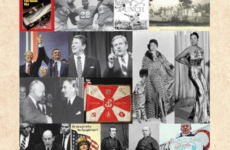By Lily Margaret Jones | Co-Editor-in-Chief
The theatre department’s latest production, Godspell, opened this past weekend; however, the road to the spring musical was not as smooth as years past.
In May 2016, it was announced that the theatre department would undertake Little Shop of Horrors for its spring 2017 musical. Over the course of a few weeks in early February of this year, Little Shop was unexpectedly changed to Avenue Q, and then changed again to Godspell.
According to Reggie Phoenix, theatre program coordinator, creative director for Salve’s Casino Theatre, and director of Godspell, there was an issue with receiving the rights to perform Little Shop. In order to legally perform a musical and gain access to the music and the script, an organization must gain the rights to the production from the rights holder.
Phoenix obtains Salve’s rights through Musical Theatre International (MTI), a global licensing agency that facilitates the process between rights holders and schools and theaters. However, you are not guaranteed the rights if you apply. Phoenix said that with MTI, you are not allowed to apply for the rights for a show until three months before your rehearsals are set to start.
“I applied for the rights probably about two and a half months before, and generally it’s turned around within a couple of days, but for some reason, it was ‘pending,'” he said. “It stayed in the pending state for two months. I called regularly, and they said that they were still waiting to hear back from the rights holders. In the meantime, Phoenix held auditions for Little Shop on a Sunday in late January. When he checked the status of his application the following Thursday, he was shocked to see that it now read “restricted.”
“I called immediately and it turns out that the entire time they were in negotiations with a [local] professional equity company to do the production,” he said. “And once a professional company gains the rights, that prevents any other productions of that show from being done in the region.”
Phoenix said that in the 15 years he’s been an educator, he has always been able to obtain the rights to his productions, and that this was an unforeseen setback for the department. “[Little Shop] was dead, there was no getting around that,” he said. “My musical director and I said, ‘Well, let’s find a play that’s similar in cast size and scale, so that we don’t have to have a second set of auditions, and hopefully we can sort of put this to bed over the weekend.’ So I did that, and we came up with the idea of doing Avenue Q. So I went ahead and purchased the rights for that. When I announced it to the students, they were not pleased to say the least.”
Phoenix decided not to hold new auditions for Avenue Q and cast based on the auditions held for Little Shop, as Avenue Q was similar in both cast size and overall scale. He felt this would save everyone time and stress, as they were already a few weeks behind in the rehearsal schedule. “The roles, in terms of type, are very similar,” he said. “There wasn’t a lot of shuffling to do.”
Racquel Jean-Louis, a senior theatre and psychology double major, auditioned for Little Shop, and was disappointed when she found out that they could not obtain the rights. However, once she learned that the new show was Avenue Q, she decided that she no longer wanted her role in the show. “Personally, because I find Avenue Q offensive, I knew I could not and would not be a part of that production,” Jean-Louis said. “It was my last show here at Salve, and I wanted it to be a show that I felt at least comfortable doing.”
Avenue Q is a musical parody of the children’s show Sesame Street and features puppets alongside adult human actors. Often described as a coming-of-age story, the show deals with strong themes such as sex, religion, education, and racism. Jean-Louis cited one of Avenue Q‘s principal songs as her biggest point of contention with the show. “I think right now all that’s been going on with Trump and all the hate that’s been so prevalent within our society, a song like ‘Everyone’s a Little Bit Racist’ is not appropriate,” she said. “I think the crude nature of this show can be seen as funny, of course, but to me it’s just offensive.”
Laura Jedynasty, a senior theatre major with a double concentration in acting and technical theatre, also auditioned for Little Shop. A week afterwards, Jedynasty spoke with Phoenix, where he told her that she, along with a few others, was cut from Avenue Q. “I didn’t really mind Avenue Q, but I did see why it was a big uproar among the kids,” Jedynasty said. “I would have loved to see what we could have done with that show, but in today’s day and age and where the country is right now, it may not have been such a good idea.”
In contrast to many of his fellow theatre students, Daniel Landino, a freshman double major in theatre and psychology, was excited at the prospect of doing Avenue Q. “Personally, I love the show because I’ve seen it, and I auditioned for Little Shop with a song from it,” he said. “But I completely understood when everyone found out and they were taken aback, because it is so offensive. You have to like that kind of humor to like that show.”
While Phoenix agreed that the show’s content is controversial, he said that students may have misunderstood what Avenue Q is truly about. “It’s hilariously funny, it’s acerbic, it’s highly intellectual, it’s really dirty, it’s got some bad language in it, but it’s got some topical elements in it that are, especially in this political climate, really substantive,” he said. “But I have to say that [students] had some valid reasons behind the idea of not strongly feeling positive about Avenue Q. We did Spring Awakening last year, which has some racy subject matter, we did Rent the year before which has some adult subject matter, and a couple of the kids said something that never occurred to me: ‘I’d really like to do a show that I could invite my grandma to.’ I really hadn’t thought about that.”
Phoenix said that he thinks that doing plays with strong and controversial themes is important, as it challenges both the actors and the audience. However, in response to his students, he enlisted their help in choosing the new musical, keeping the size of their budget in mind. One of the shows students suggested was Godspell. Phoenix quickly bought the rights and made plans to hold new auditions.
“Having to conceive a show in two weeks, as a director, is insane,” he said. “Once Avenue Q was put aside, we realized, ‘Okay, now we do have to hold new auditions [for Godspell], because now we’re talking about a completely different show, a completely different world.'”
The auditions for Godspell were held on Sunday, February 12th, the closing night of Salve Theatre’s A Midsummer Night’s Dream. Students who wanted to audition for Godspell who were also involved in Midsummer had to finish their final matinee show and deconstruct the set before auditioning for the new musical.
Jedynasty, who played Snug the Joiner in Midsummer, decided not to re-audition for Godspell, instead opting to crew for the production. “Originally, I wasn’t even going to audition for Little Shop because musicals are not my strength, but it was going to be my last show at Salve Regina,” she said. “That was the main reason I wanted to do Little Shop, but then after getting cut, and then finding out the show was changed again…I didn’t have it in me to prepare something else in a short amount of time.”
“I think they should’ve been held the next day, because we were very exhausted,” Landino, who played Lysander in Midsummer, said. “Not only physically, but emotionally as well.”
Like with Avenue Q, Phoenix had to cut more actors from the cast list. “Avenue Q had four fewer roles [than Little Shop], and then Godspell had four fewer than that,” Phoenix said. “And so, you know, you get into this situation as a director, as the head of the theatre program…there’s just no way I’m going to come out of this without any hurt feelings.”
“It created a lot of tension and a lot of stress,” Landino said. “It just made things very awkward for all of us, especially those of us who got cast all three times, or cast, cut, and then recast, or cast, cast, and then cut. We keep saying how we don’t want to be competitive, but at the same time we do want to be in the shows, and we want what’s best for everyone else. But, it’s also the nature of the business.” Landino also acknowledged that he, being cast in all three musicals, “can’t imagine” what it’s been like for people who were cut, and that others’ feelings shouldn’t be invalidated. Both Landino and Jean-Louis are featured in Godspell.
Phoenix said that the last thing he wants to do as an educator is to hurt students’ feelings, and that he and the other staff members in the theatre department did the best they could given the situation. “I hope that they’ll accept that, and forge ahead,” he said. “What I don’t want is for any negative feelings to be bubbling. We tried to do this in as a gentle and as humane a manner as possible.”














